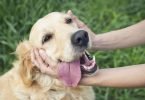Dogs are a treasure in any pet parents’ home. With their loyalty, cheerfulness, and good company, they are truly the best pets to have. However, bringing a dog to your home always comes with challenges. These furry creatures have their personalities. Sometimes, they can be unruly and out of control. We’ll discuss some of the most common behavior problems in puppies.
Destructive Chewing
Chewing on objects to their destruction is one of the most common behavior problems in puppies. No pet owner wants an unruly dog at their homes. As with any behavior problems in puppies, knowing the ‘why’ for behavior is important. It is often the key to coming up with the best strategy to unlearn an undesirable behavior.
If your puppy chews on random objects until they are destroyed, there’s a valid reason. One of the most common causes is teething. Just like with babies, puppies undergo a teething phase. This particular process could be painful to them, and chewing gives them relief from the pain. Teething usually lasts until six months of age for most puppies.
How To Stop Puppy’s Destructive Chewing?
If you notice that most furniture or cloth around the house are pretty much ruined because of your puppy’s chewing, it’s time to act. The easiest remedy is to get your puppy a chew toy. Plenty of pet stores sell chew-toys that help with teething. Furthermore, these chew toys are specially made to last long so that your puppy will always have something to chew on. These toys are safer and hazard-free to give to your puppy.
A more active way to stop behavior problems in puppies is a chewing deterrent. Identify the items that you don’t want your puppy chewing on. Then, spray a natural, non-toxic deterrent on these items. If not possible, you can spray the deterrent on a piece of fabric and allow your puppy to smell it upon chewing on an unwanted item. Once your puppy understands the desired behavior and avoids chewing destructively, praise them, or reward them with a tasty treat, which will reinforce the desired behavior.
Lastly, don’t tempt your puppies. Their self-control could only get you so far. Put away any objects you don’t want them chewing on. Out of sight, out of mind is the motto for puppies when it comes to destructive chewing. If you don’t want your puppy to ruin your expensive rug, then maybe it’s best to keep it away first until your puppy is more trained. Furthermore, make sure they’re getting enough attention from you, their pet parent. Often, these unruly destructive chewers just want to catch your attention.
What Not To Do
Now that you know what to do, it’s time to discuss the things that you shouldn’t. First, never hit your puppy. Hitting them will temporarily keep them from destructive chewing. However, this will alienate you, the pet parent, to your puppy. Your dog’s early years are his years when he’s building a relationship and bond. Thus, you don’t want your puppy to be afraid of you.
Another thing not to do is to bound their mouth to stop their destructive chewing physically. Examples are putting a packaging tape over their mouths or tying them up with a rope, which is a major no-no and is potentially fatal to your young puppy.
Play Biting
Playfulness is one of the best pet dog qualities. Puppies, especially, have a lot of energy to play around and bond with their pet parents. Play biting is one of the most common behavior problems in puppies that pet owners have to deal with. It is when your dog nips or bites at you out of playfulness. Most of the time, this is not a huge concern. However, when this happens excessively, it becomes a problem.
Just like with destructive chewing, it’s imperative to find out why your puppy likes to play bite. Dogs don’t have hands, unlike humans. Moreover, dogs use their mouths for most of their activities, whether during play, eating, or interacting. Most importantly, they use their mouth to show affection. Thus, play biting could easily be a form of affection for puppies.
Puppies get excited about pretty much anything. They get excited over a meal. They could also get excited by just seeing their pet parents. Sometimes, they get excited over seeing a mosquito flying around. When they are excited, they might show it through seemingly harmless gestures such as biting or nipping.
How To Stop Play Biting in Puppies?
First things first, allow your puppy to mouth your hand. Place your hand in front of its mouth and allow your puppy to sniff, lick, or nibble on it. Do this for a few minutes. Then, let your dog know that this behavior is something that you don’t like or hurts you. You can let out an “Aww” or “Ouch” or simply pull your hand away.
Moreover, never underestimate the power of your words when it comes to your puppy. Whenever your dog gets excited and bites or nips at you playfully, simply say ‘No.’ More often than not, your dog will understand that this behavior is not wanted. Once your dog stops biting, reward him with a treat. Do this each time your dog play-bites, and he will learn to stop in no time.
Just like with destructive chewing, giving your puppies chew toys is life-saving. Keep them busy with chew toys or just normal toys, so you’ll divert attention from nipping on you to their toys. Don’t forget to spend time with your puppies during their early times. Play biting is also a sign of seeking attention from your puppy. Thus, remember to play games with them and walk them for at least half an hour. It will also make sure they’re getting their much-needed exercise.
Puppy behavior issues like play biting could be annoying if it becomes out of control. With enough patience and compassion, stopping this behavior becomes easier.

Jumping
Does your dog randomly jump? Sometimes puppies jump just out of nowhere, and it could be problematic if you’re on a walk or outdoors. Overall, it’s just an unruly behavior that pet parents don’t particularly enjoy. Jumping is one of the frequent puppy behavior issues dog owners deal with, especially during the first few months of the puppy’s life. They do this whenever they get excited or energetic.
How to Stop Puppy From Jumping?
You might be on a walk in the park when your puppy suddenly decides to jump up and down for no reason. If this is something that happens frequently, a solution is to put your puppy on a leash. When selecting a leash for your puppy, make sure the collar component is comfortable but fit enough. Moreover, the leash should be thick enough, so it’s secure. A 6-foot leash is the standard length for any type of dog. You also want a durable material for both the leash and collar components. It will allow you to have control over your puppy’s movements while you’re outdoors. Whenever your dog jumps around, ignore him, and make sure he’s walking straight with you.
Vibrating collars are also a great option to deal with common behavior issues in puppies such as jumping. These collars are much more humane than shock collars and are easier on a small puppy. Furthermore, most of these collars have several training options. Thus, you can use them even if you’re not training your puppy. These vibrating collars are very easy to use. Simply turn on the vibration whenever your puppy jumps. This will communicate to your puppy that jumping is not acceptable behavior.
It might seem counterintuitive, but playing with your puppy and allowing him to jump up and down is helpful and effective. Jumping maybe your puppy’s way of releasing some energy and excitement. Setting aside a particular time and place for play and fun is good to let your puppy get exhausted. However, you don’t want to overdo this. Just allow him to play around with balls and other toys for a set period. After that, your puppy might feel spent and will less likely jump around unnecessarily.
Train and Repeat
As with any type of training for puppy behavior problems, consistency is key. Repetition is one of the ways your puppy learns anything. Thus, if you remain consistent with the tips above, your puppy will soon learn that jumping isn’t something it should do.
Jumping on People
It’s especially useful to know why your puppy is acting the way he does. It will aid in the strategy of stopping unwanted behavior. Puppies, just like humans, interact with their pet parents and other people on a face-to-face basis. Furthermore, puppies are quite shorter than humans. Thus, our puppies resort to jumping on us, especially during a first meeting or whenever they are excited. Pet parents probably don’t mind when this happens. They might find it adorable and cute. However, other people might not.
It could annoy your visitors if your puppy with dirty paws suddenly jumps onto their white pants. Moreover, it could also be physically dangerous. We want our pets to come off as well-behaved and friendly.
Another possible reason your puppy randomly jumps on people is that your puppy could have some unspent energy. Thus, the way to resolve it is to let your puppy release this energy. Set aside time to walk your puppy around the yard or block every day. It will ensure your dog is releasing all of its energy on exercise and not on other people.
Don’t forget that whenever your puppy jumps on you, it means that he is craving for attention and quality time. Puppies are clingy to their pet parents and are sometimes less independent than adult dogs.
The “Sit” Command
Training your dog to sit is a powerful and effective way to prevent the most common behavior issues in puppies. The “sit command” is one of the most frequently taught skills to a puppy during his first weeks. You’re lucky because puppies are quite fast learners. In no time, your puppy will learn the command, and you won’t have to deal with a jumping puppy anymore.
In this training, you need a tasty treat that will serve as a reward. Positive reinforcement applies to most dog commands used to stop puppy behavior issues. Grab your puppy’s attention and show the treat. Place the treat just in front of your puppy’s nose, which will prompt it to settle into its sitting position. Once your puppy sits, utter the word “sit” (this will serve as the prompt or command). Then, allow your puppy to eat the treat. After that, you can also reward him with praise for a good job. You can do this training repeatedly every day. Just remember to give small treats so the training won’t affect his eating patterns.
Other Ways to Stop Puppy From Jumping on People
Apart from the Sit Command, you can also simply tell your puppy “No” whenever he jumps on you or other people. If your puppy picks up on this, reward him each time with a treat to help reinforce the behavior. Moreover, you can also ignore your puppy whenever he jumps on you. It will teach your puppy that jumping is not the right way to get your attention. Never punish your puppy for jumping on people. It will only do more harm than good. By simply following the tips above, you can effectively stop behavior problems in puppies.
Getting on Counters/Furniture
We’ve already talked about puppies jumping up and down randomly, as well as puppies jumping on you and other people. Now, it’s time to address the issue of puppies getting on counters and furniture. Behavior problems in puppies like this are giving puppy parents headaches. Just like with other behavior problems in puppies, getting to the bottom of this behavior is crucial.
More often than not, puppies jump on counters because they see or smell something that they like. These things could be food, snacks, drinks, toys, or anything that caught their attention. Moreover, whenever everybody at home is sitting by the counter, your puppy might want to join in the party by jumping on the counter.
How to Stop Puppy from Getting on Counters?
The easiest and most instinctive thing to do is to remove any temptation off of your counters. Observe what particular object your puppy likes to reach or grab from the counter. Unlike humans, puppies’ impulse control is not as strong. Thus, we can help them by removing distractions and temptations. Again, out of sight, out of mind, works in this scenario also.
Furthermore, if you found that your puppy is particularly drawn to food and snacks on the counter, he could be simply hungry. Make sure you’re feeding your puppies on time and with the proper dog foods for his age. Dogs act on instinct. Thus, if they feel hungry, they will seek food, and nothing you will do can stop them from acting on their instinct. If they see food lying around, they will want to reach for it if their stomachs are empty.
Moreover, make sure your puppies are not bored out of their minds. When our puppies are bored and left with nothing to do, they eventually find something around the house to amuse themselves. It can be a rag on the counter or a decorative item. If your puppies don’t have any toys to play with, they will likely reach for things on the counter.






